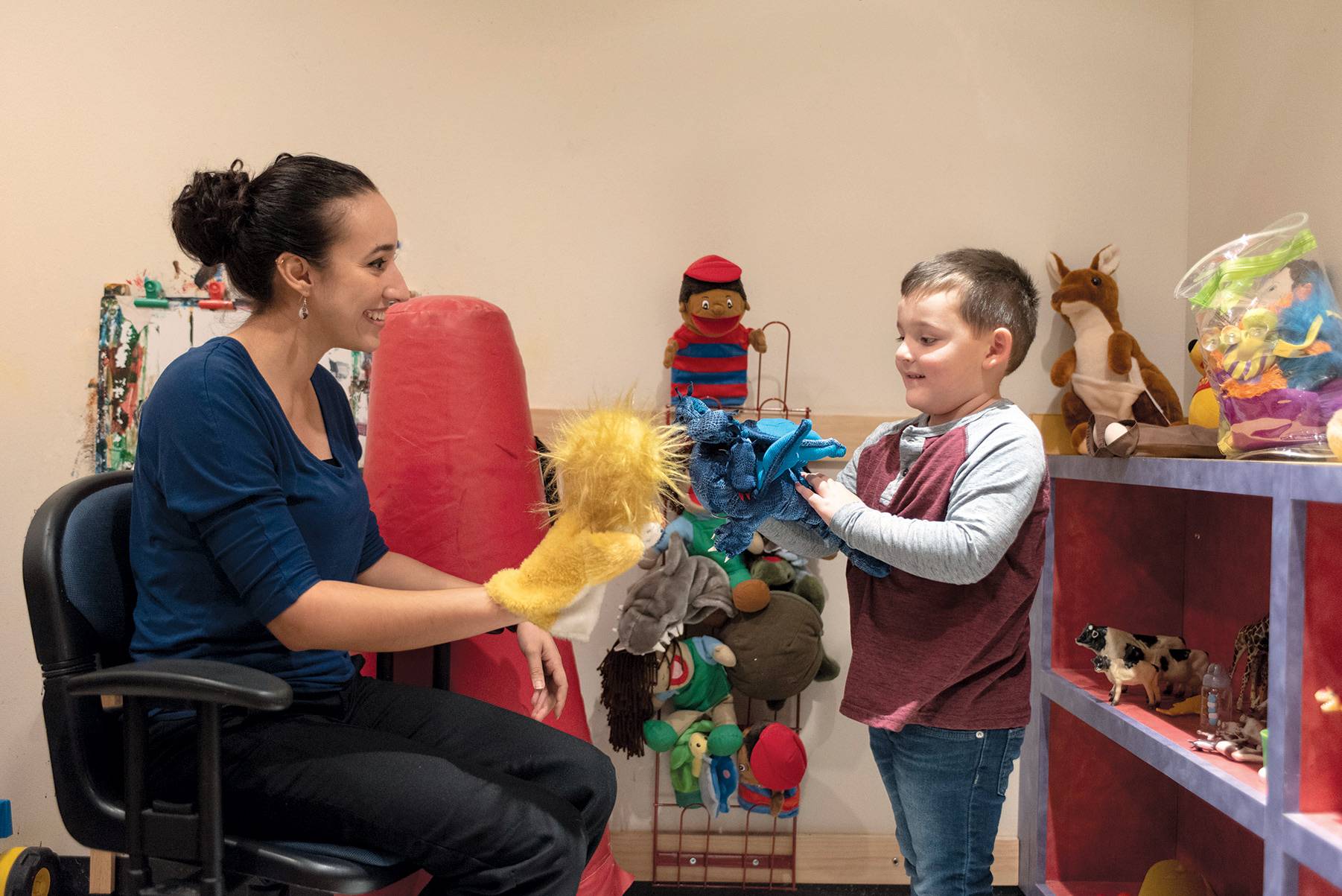Professional Counseling (M.A.)
M.A. Professional Counseling

Program Overview
The Council for Accreditation of Counseling and Related Educational Programs (CACREP) accredited program features internationally known faculty, two state-of-the-art community counseling clinics where students provide counseling to under-served populations, and a rigorous curriculum focusing on experiential learning integrated with the application of didactic, research-based knowledge. Core tenets emphasized throughout the program include diversity, advanced ethics, professional development, and self-awareness.
Course Work
The Master of Arts in Professional Counseling offers a required course sequence that builds clinical skills through didactic and experiential activities. The curriculum includes core foundational instruction in theories, clinical interventions, assessment, advanced ethics, diversity, and research. In addition to basic skills and intermediate methods courses with specialty populations, students complete a clinical practicum experience in our clinics, and internship experiences at counseling sites across the Central Texas area.
Master's Degree Programs
| Degree | Concentration | Hours | Thesis Option | Minor Option |
|---|---|---|---|---|
Degree M.A. | Concentration Clinical Mental Health Counseling | Hours 60 | Thesis Option Non-Thesis | Minor Option No minor |
Degree M.A. | Concentration Clinical Mental Health Counseling | Hours 66 | Thesis Option Thesis | Minor Option No minor |
Degree M.A. | Concentration Marriage & Family Counseling | Hours 60 | Thesis Option Non-Thesis | Minor Option No minor |
Degree M.A. | Concentration Marriage & Family Counseling | Hours 66 | Thesis Option Thesis | Minor Option No minor |
Master's Degree + Professional Certification Program
| Degree | Concentration & Certification | Hours | Thesis Option | Minor Option |
|---|---|---|---|---|
Degree M.A. | Concentration & Certification School Counseling | Hours 60 | Thesis Option Non-Thesis | Minor Option No minor |
Degree M.A. | Concentration & Certification School Counselor | Hours 48 | Thesis Option Non-Thesis | Minor Option No minor |
Program Details
Current students score at the highest levels on state and national examinations and are strongly endorsed by community mental health agencies and schools for employment.
Program Mission
The professional counseling program believes that well-prepared counselors are involved and committed to a process of intentional growth promoting pro-social autonomy, lifelong learning and ethical behavior. These ideals are fostered within a dynamic and multi-modal learning setting in which diversity, critical thinking, self-in-context, scholarship, praxis and the creation and integration of knowledge are celebrated.
The program maintains the highest standards of counselor education which garners local, national and international recognition in providing excellence in academic and clinical preparation for the development of counseling professionals.
Career Options
The professional counseling program is designed to provide training and course work graduates need to become certified as Texas School Counselors, licensed as Texas Licensed Professional Counselors, or Licensed Marriage and Family Therapists. The Institute for Play Therapy offers specialized training for those interested in becoming Registered Play Therapists or certified in animal-assisted counseling after graduation.
Program Faculty
Faculty present research at national and international conferences and publish books, book chapters and peer-reviewed journal articles in top venues in their field. The range of research and clinical interests include:
- play therapy
- animal-assisted counseling
- mindfulness
- group counseling
- addictions
- domestic violence
- sandtray therapy
- clinical supervision
- women and gender studies
- child parent relationship therapy
- advanced ethics
Contact The Graduate College for general questions about getting started with your application, funding your degree, and more. If you have program-specific questions after reviewing the program details, we encourage you to contact the following individuals.
Graduate Advisor
Dr. Maria Haiyasoso
profcounadm@txstate.edu
512.245.2579
Education Building (ED), Room 4016
Advisor Support
Camila Saldivar
profcounadm@txstate.edu
512.245.7827
Education Building (ED), Room 4012

Apply Now Already know that Texas State is right for you?
Application Deadlines
| Deadlines | U.S. Citizen | International |
|---|---|---|
Deadlines Fall - Priority | U.S. Citizen February 1 | International February 1 |
Deadlines Fall - Standard | U.S. Citizen February 15 | International February 15 |
Deadlines Spring | U.S. Citizen October 1 | International October 1 |
Deadlines Summer I | U.S. Citizen February 15 | International February 15 |
Deadlines Summer II | U.S. Citizen February 15 | International No Admission |
This program's deadline is firm. This type of deadline means the application and other application requirements must be submitted by the program's specified deadline day.
|
|
Funding Information Applications must be complete by the priority deadline to be considered for certain types of funding. |
|
|
Decision Timeline This program reviews applications on a firm basis. |
Admission Requirements
The items required for admission consideration are listed below. Additional information for applicants with international credentials can be found on our international web pages.
-
Application
- Completed online application
Review important information about the online application.
-
Application Fee
- $35 nonrefundable Texas Education Agency technology fee (if offered admission to the master's certification program)
and either - $55 nonrefundable application fee
OR - $90 nonrefundable application fee for applications with international credentials
Review important information about application fees.
- $35 nonrefundable Texas Education Agency technology fee (if offered admission to the master's certification program)
-
Transcripts & GPA
- baccalaureate degree from a regionally accredited university (Non-U.S. degrees must be equivalent to a four-year U.S. Bachelor’s degree. In most cases, three-year degrees are not considered. Visit our International FAQs for more information.)
- a copy of an official transcript from each institution where course credit was granted
- minimum 3.0 GPA in your last 60 hours of undergraduate course work (plus any completed graduate courses)
Effective Fall 2024
- baccalaureate degree from a regionally accredited university (Non-U.S. degrees must be equivalent to a four-year U.S. Bachelor’s degree. In most cases, three-year degrees are not considered. Visit our International FAQs for more information.)
- a copy of an official transcript from each institution where course credit was granted
- a 3.0 overall GPA or a 3.0 GPA in your last 60 hours of undergraduate course work (plus any completed graduate courses)
Review important information about transcripts. Official transcripts, sent directly from your institution, will be required if admission is granted.
-
Test Scores
GRE
- official GRE (general test only) required with competitive scores in the verbal reasoning and quantitative reasoning sections
The GRE may be waived if you hold a master's or doctoral degree from a regionally accredited U.S. institution. If you hold a master's or doctoral degree (or the equivalent thereof) from an accredited international institution, the GRE may be waived on an individual basis.
Approved English Proficiency Exam Scores
TOEFL Scores for school counseling and school counselor applicants*:
Applicants are required to submit TOEFL scores that meet the minimum program requirements below unless they have earned a bachelor’s degree or higher from a regionally accredited U.S. institution or one of the exempt countries found on the TEA standards and Texas State University standards.
- official TOEFL iBT scores with minimum individual scores of
- 22 listening
- 22 reading
- 24 speaking
- 21 writing
*Exceptions are made for students who have earned a Bachelor’s degree or higher from an institution of higher education in India. These students must meet the following requirements:
- official TOEFL iBT scores required with a 78 overall
- official PTE scores required with a 52 overall
- official IELTS (academic) scores required with a 6.5 overall and
- minimum individual module scores of 6.0
- official Duolingo scores required with a 110 overall
- official TOEFL Essentials scores required with an 8.5 overall
- Review important information about official test scores.
- This program does not offer admission if the scores above are not met.
This program does not offer admission if the scores above are not met.
Approved English proficiency exam scores for clinical mental health counseling & marriage and family counseling applicants:
Applicants are required to submit an approved English proficiency exam score that meets the minimum program requirements below unless they have earned a bachelor’s degree or higher from a regionally accredited U.S. institution or the equivalent from a country on our exempt countries list.
- official TOEFL iBT scores required with a 78 overall
- official PTE scores required with a 52 overall
- official IELTS (academic) scores required with a 6.5 overall and
- minimum individual module scores of 6.0
- official Duolingo Scores required with a 110 overall
- official TOEFL Essentials scores required with an 8.5 overall
Review important information about official test scores.
-
Documents
- informed consent form
- resume/CV detailing:
- unique competencies that would contribute to your aptitude for graduate study
- personal experiences, such as volunteer work, that have helped prepare you for a role as a future counselor
- any additional language skills
- any technological competence and computer literacy
- statement of purpose (maximum 750 words, typed and double-spaced) detailing:
- your professional goals and the reason you are pursuing education and training in professional counseling, as opposed to another mental health discipline (such as psychology, social work, or counseling psychology)
- your reason for choosing your specified concentration (clinical mental health counseling, marriage and family counseling or school counseling)
- your major strengths and weaknesses with respect to being admitted into this program
- how you would increase the representation of people from all backgrounds in the counseling profession
Your statement of purpose will be evaluated for content, style, and quality. While you may seek consultation and editing suggestions, this statement must be representative of your current level and style of writing and representative of what could be expected from you if accepted into the program.
- three forms of recommendation (not general reference letters)
Review important information about documents.